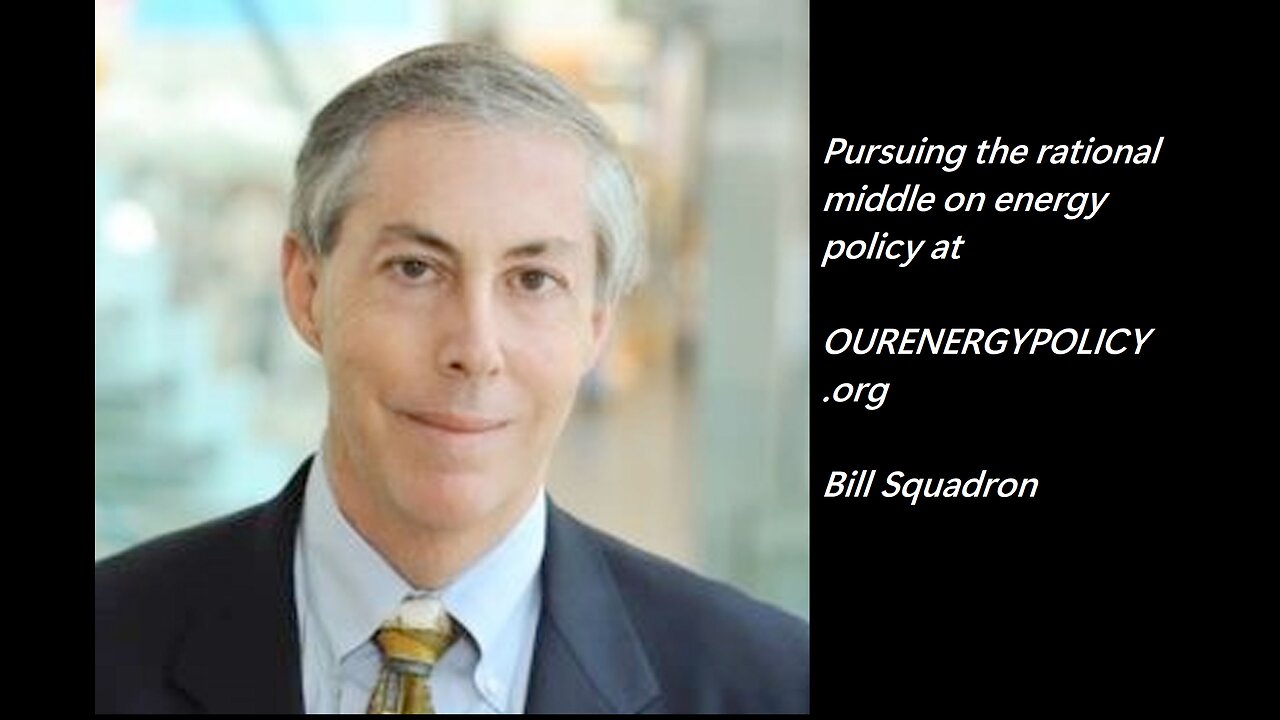Premium Only Content

OurEnergyPolicy: Bill Squadron Builds Common Ground in a Divided Field
Bill Squadron began in law, working federal energy regulation in Washington. He later ran programs for New York City under Mayor David Dinkins. His career then veered into sports technology. As head of Sportvision, he brought football fans the yellow first-down line and baseball viewers the K-Zone. But his lasting focus remained energy.
More than a decade ago, Squadron co-founded OurEnergyPolicy.org. The nonprofit’s purpose, he said, is simple: “Our goal is really to facilitate conversations and have them lead to solutions or progress.” He saw the industry too divided, each camp talking only to its own. Oil spoke to oil, solar to solar, utilities to utilities. He wanted a forum where people of opposing views could sit in one room and speak honestly.
The ground rules are strict. “The only real rule we had was it’s not supposed to get personal,” he said. “People now trust our organization when we convene these gatherings, that we’re not trying to tilt the scales.”
Today the foundation runs series on the grid, critical minerals, and the rising demand from artificial intelligence. Squadron stresses the stakes: data centers alone are reshaping energy use. Rare earths and vital minerals come from unstable nations, yet U.S. dependence on them is growing.
Nuclear, once pushed aside, is re-emerging. “There’s been much more openness now to considering developments in nuclear as part of the energy mix,” Squadron said. New small modular reactors, cheaper and safer, are shifting the debate. New York State has begun weighing them.
Still, no single source can stand alone. “Every single energy source has its own characteristics that cut in different directions,” he said. “We’re going to need natural gas, wind, solar, hydropower, and some elements of nuclear.”
Texas learned the cost of imbalance when its grid collapsed in winter. Squadron points to the lesson: “Wind and solar are more intermittent, but they are also cleaner.” Coal and gas provide steady output but carry environmental and geopolitical baggage. Nuclear offers reliability but still faces public resistance.
Meanwhile research races ahead. Hydrogen, geothermal, and fusion hold promise. Squadron is cautious. “There’s enormously creative work being done in trying to stay ahead of increasing demand for energy,” he said. “Some research will bear fruit, and honestly some of it won’t—that’s the nature of research.”
Despite the obstacles, his outlook remains firm. “I’m quite optimistic and hopeful because I’ve seen brilliant people working on these issues,” he said.
The organization he built stands apart by design: it does not lobby, it does not endorse laws or candidates. It convenes. Leaders from government, utilities, oil, gas, clean energy, and academia take part. The conversations are civil, the tone fact-based. In an era of bitter partisanship, Squadron sees that as its achievement and its mission.
-
 LIVE
LIVE
MattMorseTV
1 hour ago🔴Senate VOTES to END the SHUTDOWN.🔴
2,454 watching -
 27:05
27:05
Robbi On The Record
5 hours agoThe Secret to Aging Strong: What Your Body’s Been Trying to Tell You
1231 -
 3:05:05
3:05:05
GamerGril
5 hours agoThere's A Killer Afoot 💞Until Dawn: The Final Gril💞
60.2K3 -
 LIVE
LIVE
LadyDesireeMusic
2 hours ago $2.50 earnedCookin & Convo - Potato Soup, Ham & Apple Pie
253 watching -
 51:25
51:25
The Connect: With Johnny Mitchell
1 day ago $40.15 earnedInside The REAL Narco State: The Colombian Drug Cartels DOMINATING The Global Cocaine Trade
54.6K30 -
 LIVE
LIVE
bucketofish
3 hours ago///ARC Raiders || Loot, Scoot + Boogie
70 watching -
 5:41:25
5:41:25
GritsGG
6 hours ago#1 Most Warzone Wins 3953+!
29.8K2 -
 LIVE
LIVE
Spartan
2 hours agoGetting to DLC Boss on Stellar Blade (Hard Mode), then moving on to something else.
46 watching -
![THIS GAME IS SO OLD :: Half-Life (1998) :: FINISHING IT TODAY [FIRST TIME PLAYING] {18+}](https://1a-1791.com/video/fww1/5e/s8/1/A/6/a/y/A6ayz.0kob-small-THIS-GAME-IS-SO-OLD-Half-Li.jpg) LIVE
LIVE
a12cat34dog
4 hours agoTHIS GAME IS SO OLD :: Half-Life (1998) :: FINISHING IT TODAY [FIRST TIME PLAYING] {18+}
96 watching -
 10:23
10:23
Forrest Galante
13 hours agoAsking an Indian Billionaire Why He Is Saving 1 Million Animals
95.5K37